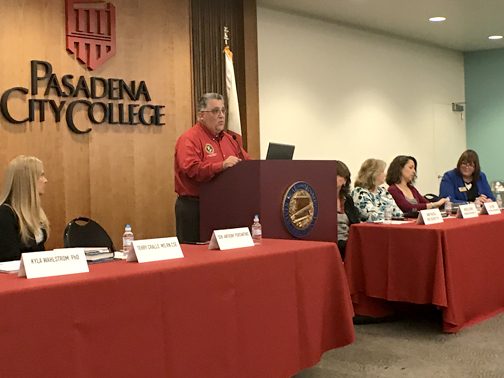State Senator Anthony Portantino has introduced SB 328, a California State Senate bill which seeks to move the start time for middle and high school students ahead to no earlier than 8:30 a.m. The bill is currently riding a wave of support for the idea.
“Pediatricians support this, the Centers for Disease Control recommends this, medical experts and psychologists have all come out in support of this. Let’s have a conversation about it and hear from the researchers,” Portantino said as he welcomed members of the public to a town hall style meeting he held in conjunction with the First District Parent Teacher Association on April 13 at Pasadena City College.
The meeting saw presentations from researchers in the fields of sleep study and pediatric medicine that pertained to the science of why a later start time was beneficial to students’ overall health and success in school. The average start time across the state is 8:07 a.m. Locally Glendale Unified School District begins class at 7:55 a.m. This early start time is incompatible with a natural shift which occurs in adolescence to a different sleep needs schedule.
For all humans, sleep is determined by light. When the sun goes down and our eyes take in less light, the brain signals it’s time to fall asleep. It releases a chemical called melatonin that begins to shut things down for the night. The sleepy feeling is caused by a secretion of melatonin. In the morning, after having enough sleep and as eyes perceive a bit of light filtering through the eyelids, the brain stops secreting melatonin and allows you to wake up. If the brain is still secreting melatonin when you wake up, you feel drowsy and need caffeine to counteract the melatonin, the two chemicals battling in the brain. This cycle of sleeping and waking on a certain schedule is called a circadian rhythm. In puberty, these rhythms are thrown off.
Young children, as any parent knows, wake up early. But teens stay up later, wake up later and need more sleep overall. This is not because they are stubborn, it is because melatonin secretion doesn’t begin in earnest until about 10:45 p.m., said Dr. Kyla Wahlstrom, senior research fellow at the University of Minnesota. Then the secretion doesn’t shut off completely until about 9 a.m. So between those hours, the teen brain is not able to function at its full potential. And with school starting at 8 a.m., or 7 a.m. for zero period, the student is at a disadvantage.
“We should all make sufficient sleep a personal, family, classroom and workplace value. We have to be role models to our children, we have to practice good sleep habits, we have to take it seriously, we have to prioritize it, and we have to give them every advantage possible,” said Terry Cralle, registered nurse and certified clinical sleep educator. “Every child deserves to reach their full potential.”
If this bill passes, it could mean impactful changes to the work and pick up/drop off schedule for parents. In GUSD, Superintendent Winfred Roberson is willing to work through the logistics if it should happen. Roberson has experience with the late start logistics, as his former post at Davis Joint Unified School District has shown him that it is a workable model when that board of education decided to switch to a later start time.
“It’s crucial that educators first consider things that are good for students. It is also important that we fully understand the impacts our decisions will have on the community that supports our schools,” Roberson said. “If this bill should pass, we would assemble a team of school and community stakeholders to explore solutions to the logistical impacts on GUSD.”
The bill is currently in the State Senate and Portantino is optimistic about its outcome.
“I’d like to say [the likelihood of passing is] 100%, but I do think we have a good shot,” Portantino said. “I think the start of the movement happened in the last two months and there’s no greater grassroots organization in California for education policy than PTA, so having the PTA take a long look at this and says we want to help with this I think is a good thing.”

